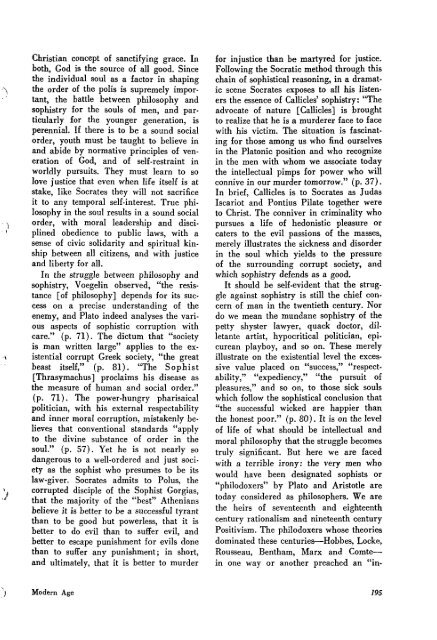Plato and Aristotle
Plato and Aristotle
Plato and Aristotle
Create successful ePaper yourself
Turn your PDF publications into a flip-book with our unique Google optimized e-Paper software.
I<br />
\<br />
Christian concept of sanctifying grace. In<br />
both, God is the source of all good. Since<br />
the individual soul as a factor in shaping<br />
the order of the polis is supremely impor-<br />
tant, the battle between philosophy <strong>and</strong><br />
sophistry for the souls of men, <strong>and</strong> par-<br />
ticularly for the younger ,generation, is<br />
perennial. If there is to be a sound social<br />
order, youth must be taught to believe in<br />
<strong>and</strong> abide by normative principles of ven-<br />
eration of God, <strong>and</strong> of self-restraint in<br />
worldly pursuits. They must learn to so<br />
love justice that even when life itself is at<br />
stake, like Socrates they will not sacrifice<br />
it to any temporal self-interest. True phi-<br />
losophy in the soul results in a sound social<br />
order, with moral leadership <strong>and</strong> disci-<br />
plined obedience to public laws, with a<br />
sense of civic solidarity <strong>and</strong> spiritual kin-<br />
ship between all citizens, <strong>and</strong> with justice<br />
<strong>and</strong> liberty for all.<br />
In the struggle between philosophy <strong>and</strong><br />
sophistry, Voegelin observed, “the resis-<br />
tance [of philosophy] depends for its suc-<br />
cess on a precise underst<strong>and</strong>ing of the<br />
enemy, <strong>and</strong> <strong>Plato</strong> indeed analyses the vari-<br />
ous aspects of sophistic corruption with<br />
care.” (p. 71). The dictum that “society<br />
is man written large” applies to the ex-<br />
istential corrupt Greek society, “the great<br />
beast itself,” (p. 81). “The Sophist<br />
[Thrasymachus] proclaims his disease as<br />
the measure of human <strong>and</strong> social order.”<br />
(p. 71). The power-hungry pharisaical<br />
politician, with his external respectability<br />
<strong>and</strong> inner moral corruption, mistakenly be-<br />
lieves that conventional st<strong>and</strong>ards “apply<br />
to the divine substance of order in the<br />
SOU~.” (p. 57). Yet he is not nearly so<br />
dangerous to a well-ordered <strong>and</strong> just soci-<br />
ety as the sophist who presumes to be its<br />
law-giver. Socrates admits to Polus, the<br />
corrupted disciple of the Sophist Gorgias,<br />
that the majority of the “best” Athenians<br />
believe it is better to be a successful tyrant<br />
than to be good but powerless, that it is<br />
better to do evil than to suffer evil, <strong>and</strong><br />
better to escape punishment for evils done<br />
than to suffer any punishment; in short,<br />
<strong>and</strong> ultimately, that it is better to murder<br />
for injustice than be martyred for justice.<br />
Following the Socratic method through this<br />
chain of sophistical reasoning, in a dramatic<br />
scene Socrates exposes to all his listeners<br />
the essence of Callicles’ sophistry: “The<br />
advocate of nature [Callicles] is brought<br />
to realize that he is a murderer face to face<br />
with his victim. The situation is fascinating<br />
for those among us who find ourselves<br />
in the <strong>Plato</strong>nic position <strong>and</strong> who recognize<br />
in the men with whom we associate today<br />
the intellectual pimps for power who will<br />
connive in our murder tomorrow.’’ (p. 37).<br />
In brief, Callicles is to Socrates as Judas<br />
Iscariot <strong>and</strong> Pontius Pilate together were<br />
to Christ. The conniver in criminality who<br />
pursues a life of hedonistic pleasure or<br />
caters to the evil passions of the masses,<br />
merely illustrates the sickness <strong>and</strong> disorder<br />
in the soul which yields to the pressure<br />
of the surrounding corrupt society, <strong>and</strong><br />
which sophistry defends as a good.<br />
It should be self-evident that the struggle<br />
against sophistry is still the chief concern<br />
of man in the twentieth century. Nor<br />
do we mean the mundane sophistry of the<br />
petty shyster lawyer, quack doctor, dilletante<br />
artist, hypocritical politician, epicurean<br />
playboy, <strong>and</strong> so on. These merely<br />
illustrate on the existential level the excessive<br />
value placed on ccsuccess,yy “respectability,”<br />
“expediency,” “the pursuit of<br />
pleasures,” <strong>and</strong> so on, to those sick souls<br />
which follow the sophistical conclusion that<br />
“the successful wicked are happier than<br />
the honest poor.” (p. 80). It is on the level<br />
of life of what should be intellectual <strong>and</strong><br />
moral philosophy that the struggle becomes<br />
truly significant. But here we are faced<br />
with a terrible irony: the very men who<br />
would have been designated sophists or<br />
“philodoxers” by <strong>Plato</strong> <strong>and</strong> <strong>Aristotle</strong> are<br />
today considered as philosophers. We are<br />
the heirs of seventeenth <strong>and</strong> eighteenth<br />
century rationalism <strong>and</strong> nineteenth century<br />
Positivism. The philodoxers whose theories<br />
dominated these centuries-Hobbes, Locke,<br />
Rousseau, Bentham, Marx <strong>and</strong> Comtein<br />
one way or another preached an “in-<br />
Modern Age 195
















